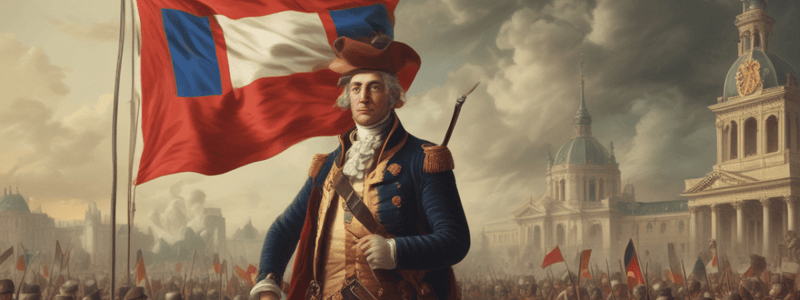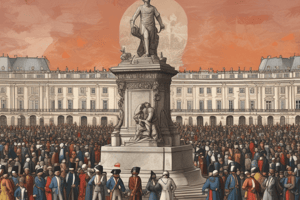Podcast
Questions and Answers
In a type of government called _______________, all power lies in one person, often the king or queen.
In a type of government called _______________, all power lies in one person, often the king or queen.
Absolute Monarchy
A middle class person is known as a _______________.
A middle class person is known as a _______________.
Bourgeoisie
The rate of increase in prices over a given period of time is known as _______________.
The rate of increase in prices over a given period of time is known as _______________.
Inflation
The Tennis Court Oath started on _______________ at the palace of Versailles.
The Tennis Court Oath started on _______________ at the palace of Versailles.
The process of beginning to use machines, technology to do work is known as _______________.
The process of beginning to use machines, technology to do work is known as _______________.
The practice of growing crops or raising animals is known as _______________.
The practice of growing crops or raising animals is known as _______________.
The intent to destroy a national or religious group is known as _______________.
The intent to destroy a national or religious group is known as _______________.
The Invention of the _______________ was a machine used for spinning wool or cotton.
The Invention of the _______________ was a machine used for spinning wool or cotton.
The Indian Act classified Indians into two categories: ______ Indians and Status Indians.
The Indian Act classified Indians into two categories: ______ Indians and Status Indians.
The goals of the Indian Act were ______ and assimilation.
The goals of the Indian Act were ______ and assimilation.
The Indian Act was imposed on Aboriginal people by the ______.
The Indian Act was imposed on Aboriginal people by the ______.
The Canadian government established a system of ______ schooling through the goal of assimilation.
The Canadian government established a system of ______ schooling through the goal of assimilation.
The residential schools prohibited Indigenous children from speaking their own ______.
The residential schools prohibited Indigenous children from speaking their own ______.
The Indian Act was used to destroy ______ and community through residential schools.
The Indian Act was used to destroy ______ and community through residential schools.
Flashcards are hidden until you start studying
Study Notes
Systems of Government and Society
- Absolute Monarchy: a government where all power lies in one person, often the king or queen.
- Feudalism: a medieval model of government before the birth of the modern nation-state.
Important Events and Groups
- Tennis Court Oath: an oath taken on June 20, 1789, at the Palace of Versailles, marking the beginning of the French Revolution.
- National Assembly: a group that played a key role in the French Revolution.
- Declaration of the Rights of Man and Citizen: a document adopted in 1789, stating the fundamental principles of the French Revolution.
- Reign of Terror: a period of violence during the French Revolution, marked by the establishment of the Committee of Public Safety.
Economic Systems and Concepts
- Capitalism: an economic system.
- Socialism: a way to organize a society.
- Mechanization: the process of beginning to use machines and technology to do work.
- Urbanization: the increase in population of people living in towns and cities.
- Agriculture: the practice of growing crops or raising animals.
- Inflation: the rate of increase in prices over a given period of time.
- Deficit: a deficiency in amount or price.
Industrial Revolution
- First Industrial Revolution in Britain: started in the late 18th and 19th centuries, marked by mechanization, including the invention of the Spinning Jenny.
- Spinning Jenny: a machine used for spinning wool or cotton.
- Steam Engine: a machine using steam power to perform mechanical work through heat.
- Changes to Transportation: the use of steam engines led to the development of locomotives and steam boats, revolutionizing transportation.
Social and Political Concepts
- Assimilate: the process of becoming similar to others.
- Paternalism: making all the decisions for the people you govern.
- Colonialism: control by one power over another.
- Cultural Genocide: the intent to destroy a national or religious group.
- Reserves: held back for future use.
The Indian Act
- Classifications: Non-Status Indians and Status Indians.
- Goals: control and assimilation.
- The Indian Act is paternalistic, treating Aboriginal people like children that need parents to look after them.
- The Indian Act is not a treaty and was imposed on Aboriginals by the government.
Residential Schools
- Established by the Canadian government to assimilate Indigenous peoples into a settler society.
- Trauma and Abuse: widespread physical, emotional, and sexual abuse of Indigenous children.
- Control over education, prohibiting Indigenous languages and cultural practices.
- Children were taken away from their homes, unable to communicate with their families.
Studying That Suits You
Use AI to generate personalized quizzes and flashcards to suit your learning preferences.





